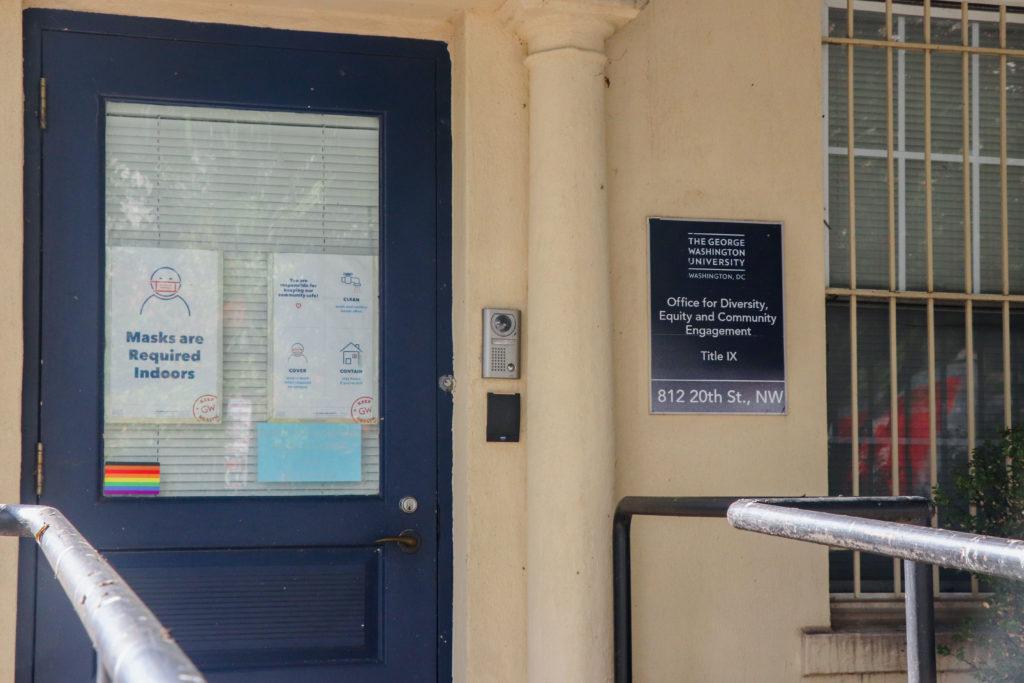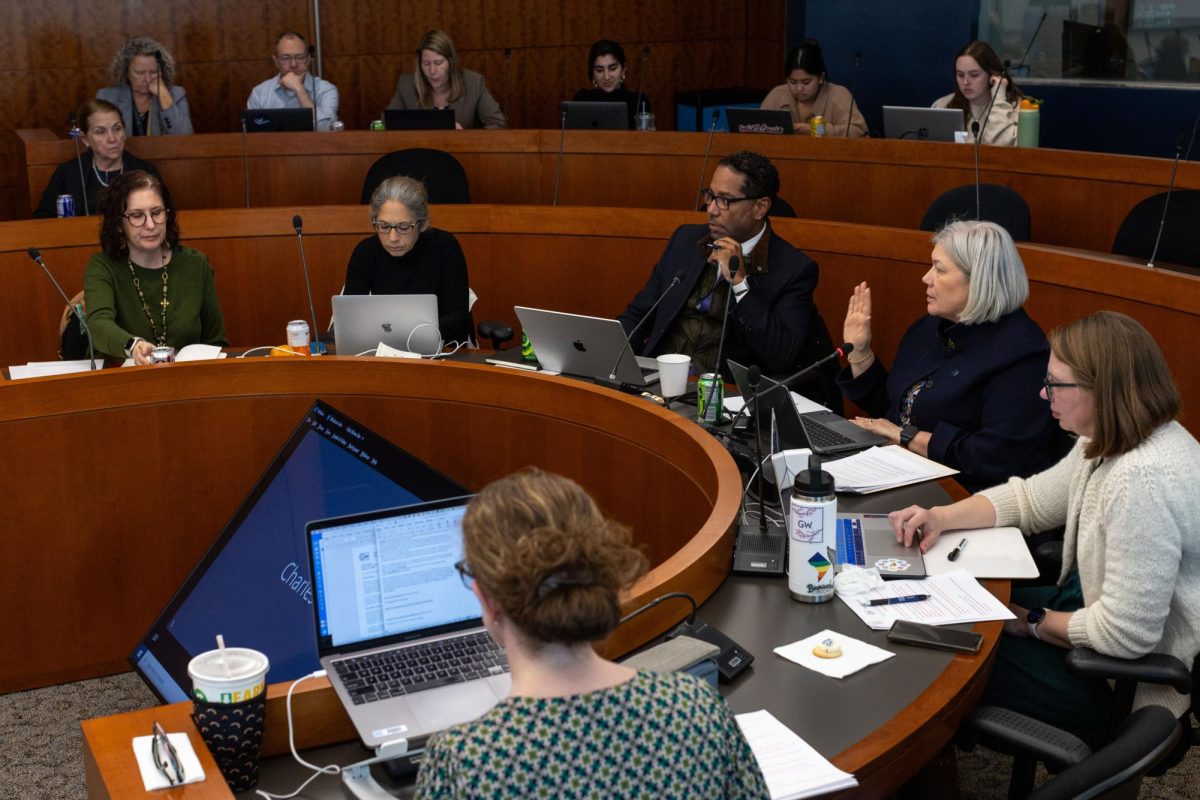Officials said GW is preparing to offer mandatory Title IX training to faculty and staff pending the approval of proposed federal regulations from the Department of Education.
President Joe Biden’s administration’s proposed changes would mandate all faculty and staff attend Title IX training instead of just Title IX Office employees, broaden the legal definition of sexual harassment and discrimination at colleges and universities to include protections for LGBTQ+ students and bar discrimination against pregnant students and employees. Charles Bendit, the chair of the Board of Trustees Audit and Compliance Committee, called a 20-percent faculty participation in voluntary Title IX training at GW “unacceptable” during the Board’s meeting in May.
While ED has not published a timeline for the implementation of the final Title IX changes, updates to federal Title IX regulations under the administration of former President Donald Trump took the department about a year and a half to implement after introducing them because of public comment and ED revision.
Caroline Laguerre-Brown, the vice provost for diversity, equity and engagement at GW, said the federal government only requires that Title IX Office personnel receive training on how to deal with accusations of discrimination and sexual harassment, but under the new rules, all University employees will be required to complete training on sex-based discrimination under Title IX regulations.
“In the coming weeks, the provost’s office will work with our deans to reinforce and ensure full participation in preventing harassment and discrimination, which includes all the necessary timeline content for faculty and staff,” she said.
Five of GW’s 12 peer schools – the University of Miami and Boston, New York, Tufts and Syracuse universities – already have mandatory training for their faculty and staff. Officials required incoming GW students to complete both virtual and in-person Title IX training courses and an online sexual assault prevention module this fall.
Laguerre-Brown said the Title IX Office will be able to respond more broadly to different types of gender discrimination under the Biden administration’s proposed Title IX changes. Under the potential updates, the definition of sexual discrimination would now include acts of sex discrimination on the basis of sex stereotypes, sex characteristics, pregnancy or related conditions, sexual orientation and gender identity, according to ED’s website.
“All of these additional protections are currently covered under the University’s broad anti-discrimination policy, but not currently under the Title IX policy,” Laguerre-Brown said at the Faculty Senate meeting Friday.
Biden’s Title IX policy would reverse the Trump administration’s efforts to reduce Title IX protections, which narrowed the definition of sexual harassment to be any form of unwelcome conduct that is “serious, pervasive and objectively offensive.” Trump’s Title IX policy also required post-secondary institutions to hold live hearings for sexual misconduct cases, where witnesses were allowed to be cross-examined.
She said officials formed a Title IX regulations task force in July to review the changes to federal Title IX policy the White House proposed in June and receive feedback from the community on how best to implement it. She said the task force will hold an online forum with community members in the coming weeks to receive feedback about the rule changes.
Experts in higher education Title IX policy said Title IX training helps faculty and staff navigate how to respond to sexual harassment and gender discrimination complaints. They said the low number of employees who have participated in the training at GW could pose a “danger” to students, who may not be able to get the assistance they need without trained staff.
Adrienne Lyles, the executive director and Title IX coordinator in the Office for Gender Equity and Inclusion at the University of Cincinnati, said GW’s nonrequired training and low rate of faculty completion is typical for universities because of the difficulties in coordinating voluntary training for hundreds of employees. The current federal policy only requires staff in the Title IX office to be trained, not all other faculty and staff.
“I do not think it’s just Title IX,” she said. “Faculty, like everyone, they’re tired. They feel overwhelmed. And, if whatever training it is isn’t created with their participation and buy-in, it’s hard to get them to want to do it. And that’s not a Title IX thing, that’s a training thing. And it is nationwide.”
Christina Percoski, a training specialist at Syracuse University, said Syracuse registered 100 percent participation among its employees as part of mandatory Title IX training during the previous academic year. She said New York requires annual sexual harassment prevention training for employers with a staff larger than 15 people.
The District does not require colleges and universities to conduct Title IX training for faculty and staff, but other local institutions – like American, Catholic and Gallaudet universities – require their employees to receive training once hired.
Percoski said increasing participation numbers for voluntary Title IX training can be “difficult” with faculty balancing heavy workloads and conflicting obligations. She said mandatory Title IX training gives all employees the same level of knowledge on how to deal with sexual assault and gender discrimination complaints.
“I think the danger there is that a student might not get information that they might need to make the decision that is right for them in that situation,” she said. “The first person that a victim of sexual violence connects with makes such an impact on how that person gets help.”
All faculty members at GW are designated reporters, meaning they are required to report accusations of sexual harassment, assault and domestic violence to GW’s Title IX coordinator, according to the Title IX Office website.
Susan Stone – an attorney and the co-chair of the Student and Athlete Defense Title IX Practice Group at Kohrman, Jackson and Krantz law firm in Ohio – said Title IX training could benefit all campus community members to guarantee students are aware of the resources offered to them and faculty are aware of their duties as trusted employees.
She said training can educate faculty about their role and responsibilities as mandatory reporters. The proper way to handle a Title IX complaint can be “confusing” for faculty if training is not required, she added.
“Certain people are defined in policies as mandatory reporters,” Stone said. “So if you hear of someone who might have been sexually assaulted, certain people are identified, and they have to report to the Title IX office that they believe someone’s been assaulted.”
Sandra Hodgin, the founder and CEO of Title IX Consulting Group, a company that advises colleges and universities on how best to handle Title IX policies and complaints, said the University could be prone to legal troubles if officials improperly handled a future sexual harassment claim while faculty and staff remain without Title IX training. Last fall, student leaders alleged the University mishandled sexual assault reports, leaving survivors fearful their abusers would return to campus.
“Campuses, when they are not looking at best practices because they feel that it’s not mandatory or required, they’re really missing the bigger picture and they are misstepping in areas where it could lead to a lawsuit,” she said. “That really is what they are trying to avoid the most in staying compliant.”











